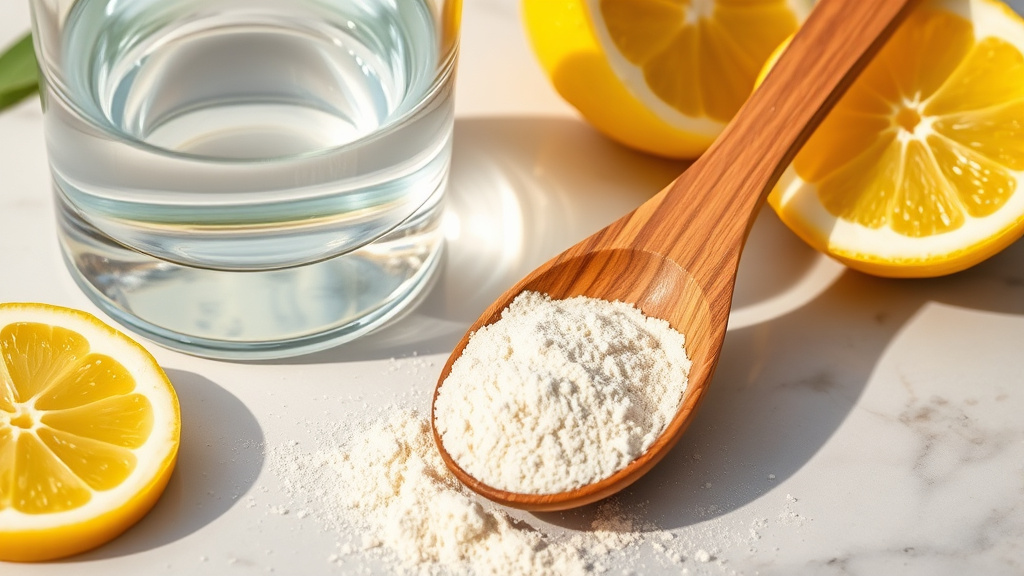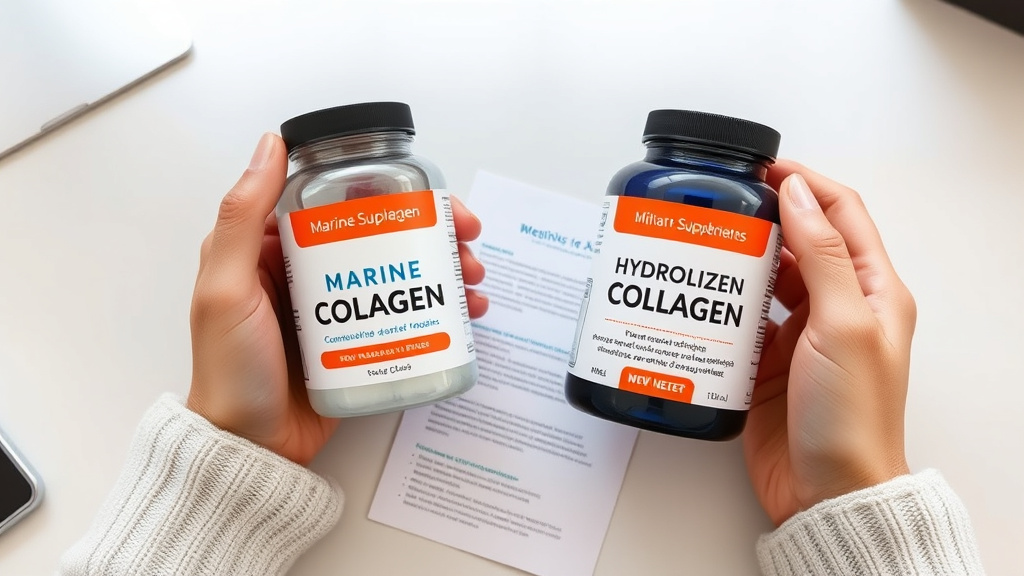Enhance Wellness: Best Collagen Supplements for Skin and Joints (2025 Guide)
When it comes to maintaining a youthful appearance and supporting joint health, nothing quite matches the reputation of collagen. Often dubbed the body’s scaffolding, collagen is essential for preserving skin elasticity and repairing joint cartilage. As we age, natural collagen production declines, leading to visible signs of aging and joint discomfort. That’s why many health-conscious individuals turn to the best collagen supplements for skin and joints, aiming to replenish their body’s collagen levels. Whether you’re looking to improve your skin’s firmness or support your joint health, understanding the different types of collagen and how to incorporate them effectively into your routine is crucial. This comprehensive guide dives into the science, types, and selection tips for collagen supplements, backed by clinical studies and practical insights.
In recent years, collagen for anti-aging has gained popularity not only for its ability to enhance skin appearance but also for its role in joint support and overall bone health. Marine collagen benefits, for instance, are often highlighted because of their high bioavailability and excellent compatibility with human skin and cartilage tissues. Incorporating collagen peptides for skin elasticity and joint resilience can be a game-changer, especially for busy professionals seeking a convenient, science-backed supplement to enhance long-term wellness.

Collagen supports radiant skin and healthy joints.
Why Collagen Matters for Skin and Joints
Collagen as a Key Structural Protein
Collagen is the most abundant protein in the human body, accounting for approximately 30% of total body protein. It provides the structural framework for skin, bones, tendons, ligaments, and cartilage. Think of collagen as the body’s natural building blocks—offering strength, flexibility, and support. As aging accelerates, collagen fibers become fragmented and less organized, leading to wrinkles, sagging skin, and reduced joint cushioning. Supplementing with targeted collagen supplements can promote protein synthesis, support skin elasticity, and help maintain healthy connective tissues. Its role as a key structural protein underscores why maintaining optimal collagen levels is vital for overall physical resilience.
Collagen and Skin Elasticity
The quest for youthful, glowing skin often brings collagen for anti-aging into focus. Collagen fibers give skin its firmness and suppleness, but their decline contributes directly to wrinkles and fine lines. Clinical studies have shown that marine collagen can increase skin hydration and elasticity, thanks to its high bioavailability and similarity to human collagen. Topical creams can offer benefits, but ingestible collagen peptides have demonstrated more profound effects on stimulating fibroblasts—the cells responsible for producing new collagen. These peptides, especially hydrolyzed collagen, are easily absorbed and utilize the body’s natural protein synthesis pathways to rebuild skin’s structural matrix from within. Therefore, collagen supplements are not just about aesthetic enhancement; they are a practical, science-backed approach to improving skin health over the long term.
Collagen and Joint Function
Listing collagen as an anti-aging supplement isn’t just about aesthetics; it also protects and supports joint health. The cartilage surrounding joints relies heavily on collagen Type II, which acts as a shock absorber and provides structural support. As collagen production diminishes with age, cartilage becomes fragile, leading to stiffness, discomfort, and even osteoarthritis. Several clinical studies have documented the benefits of collagen peptides for joint support, including reduced pain and improved joint mobility. Well-designed supplements containing hydrolyzed collagen are particularly effective because they deliver bioavailable collagen fragments that stimulate the regeneration of joint cartilage and reinforce joint cartilage repair mechanisms. Whether you experience mild stiffness or more persistent pain, collagen supplementation offers a promising, natural approach to maintaining joint health.
Best Collagen Supplements for Skin and Joints
Type I Collagen – Skin and Hair

Type I collagen supports skin firmness and hair growth.
Type I collagen, constituting about 90% of collagen in the body, is primarily found in skin, hair, and tendons. It is renowned for its role in collagen for anti-aging and skin health. This form of collagen provides tensile strength and contributes significantly to skin’s firmness and smoothness. When choosing a supplement, look for hydrolyzed collagen peptides derived from bovine or marine sources, as these are broken down into smaller molecules, facilitating better absorption and bioavailability. Marine collagen, in particular, has been praised for its superior digestibility and efficacy in boosting skin elasticity, making it a top choice for those prioritizing visible skin benefits.
Type II Collagen – Joints and Cartilage
Type II collagen is predominant in cartilage tissue and is essential for joint health. Supplementing with Type II collagen can help stimulate chondrocytes, the cells responsible for producing cartilage, thereby assisting in joint cartilage repair. Many users report decreased joint discomfort and increased mobility after consistent use, supported by clinical research. It’s noteworthy that collagen for joint support often contains higher amounts of hydrolyzed Type II collagen, which has shown to be effective in modalities designed to treat osteoarthritis symptoms.
Marine Collagen vs. Bovine Collagen
Marine and bovine collagen are the two most common sources of supplemental collagen. Marine collagen benefits include higher bioavailability due to smaller peptide size and a higher concentration of Type I collagen, ideal for skin and hair health. Conversely, bovine collagen, rich in Type I and Type III collagen, is often preferred for improving skin and general connective tissue support. The decision ultimately depends on individual health goals and dietary preferences. For example, those with dairy sensitivities might lean towards marine collagen, while those focused on joint support might choose bovine-derived supplements.
Hydrolyzed Collagen Peptides
Hydrolyzed collagen peptides refer to collagen molecules broken down into smaller fragments, which are easier for the body to absorb. These peptides are the cornerstone of most effective collagen supplements because they directly promote protein synthesis and tissue repair. When searching for the best collagen supplements for skin and joints, prioritize products labeled as hydrolyzed, ensuring maximum bioavailability. Combining hydrolyzed collagen with other ingredients, such as vitamin C, can further enhance collagen synthesis and improve flexibility, skin health, and joint function.
How to Choose the Right Collagen Supplement
Absorption and Bioavailability

Hydrolyzed collagen ensures better absorption.
Opting for collagen that boasts high bioavailability is essential for reaping maximum benefits. Hydrolyzed collagen peptides are known for their superior digestibility, as small molecular sizes enable rapid absorption through the gastrointestinal tract. Look for products that specify their collagen source, peptide size, and whether they are hydrolyzed, ensuring your supplement is efficiently delivered to where it’s needed most. Incorporating foods or supplements rich in vitamin C can significantly augment absorption and collagen synthesis, as vitamin C is a vital co-factor involved in collagen biosynthesis.
Additional Ingredients (Vitamin C, Hyaluronic Acid)
While collagen peptides are effective on their own, the presence of synergistic ingredients can amplify their benefits. For skin anti-aging, added hyaluronic acid can improve hydration and plumpness, while vitamin C enhances collagen synthesis and stability. Some formulations include herbal remedies such as turmeric or reduce inflammation, which can further support joint health and reduce oxidative stress. When choosing a product, review the ingredient list to ensure it contains these complementary compounds for an overall wellness boost.
Safety and Quality Standards
Ensure your collagen supplement adheres to reputable safety standards. Look for certifications or third-party testing to verify purity and absence of contaminants. High-quality collagen is sourced from sustainable, responsibly farmed animals or wild-harvested marine sources. For those prioritizing natural and clean supplements, choosing products aligned with safety standards guarantees efficacy and peace of mind.
FAQs about the Best Collagen Supplements for Skin and Joints
How long before I see results?
Typically, visible improvements in skin hydration and elasticity can be observed within 4-6 weeks of regular collagen supplementation. For joint support, some individuals report reduced discomfort as early as 3-4 weeks, but consistent use over several months often yields more sustained benefits.
Is marine collagen better than bovine collagen?
Marine collagen offers superior bioavailability and is often more effective for skin health, thanks to its high content of Type I collagen. Bovine collagen, however, tends to support overall skin, bones, and joint health with its higher concentration of Types I and III. The best choice depends on your specific health goals and dietary considerations.
Can collagen supplements really reduce wrinkles?
Yes, multiple clinical studies suggest that oral collagen supplementation can enhance skin elasticity, hydration, and reduce the appearance of wrinkles over time. Consistent use of collagen peptides stimulates fibroblasts, leading to increased collagen and elastin production in the skin matrix.
Conclusion
In summary, selecting the best collagen supplements for skin and joints involves understanding the various types of collagen and their specific roles—Type I for skin and hair, and Type II for joint support. Hydrolyzed collagen peptides, especially from marine sources, offer excellent bioavailability and proven efficacy, supported by clinical studies. Incorporating supplements with additional ingredients such as vitamin C and hyaluronic acid can further enhance collagen synthesis and tissue repair, providing a comprehensive approach to aging gracefully and maintaining joint mobility. With thoughtful choice and consistent use, collagen supplementation can be a vital part of your wellness journey, helping you maintain youthful skin and resilient joints long into your golden years.
Discover more supplement insights in our Supplements Hub for tailored advice and product reviews to optimize your health.
